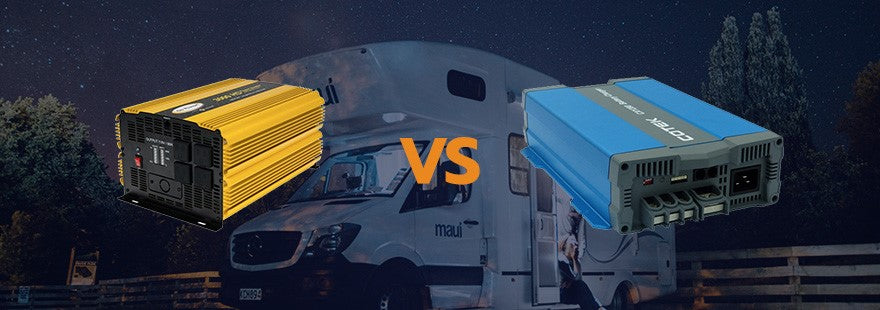Count on Boat & RV Accessories to teach you about power converters and inverters, and address your inverter vs converter questions.
We understand that there are different degrees of nature lovers. Some people enjoy living without any modern advances, relying on their knowledge and survival skills to enjoy each day. There are many more of us nature lovers who enjoy the scenery, yet want to watch a movie with our friends and family while on vacation. For better or worse, our lives are powered by electricity. This amazing energy source handles many of our basic needs and many more of our entertainment and luxuries.
Fortunately, our RVs have systems that let us make all the power we need, just by running the engine. An RV power converter makes this magic happen.
And thanks to the pace of technology, power systems are improving by leaps and bounds, getting more powerful and less expensive. Furthermore, they are also being built to work with renewable energy systems, such as solar panels.
Still, an RV's power system is a bit trickier than the one in your home. It takes some knowledge about how power is created and stored for use. This report should answer a lot of your converter vs inverter questions.
We have built partnerships with some of the most respected power manufacturers in the industry, so that we can offer you high-quality systems at lower prices. We also have a full line of replacement parts and other accessories that can help make your RV's power system much more efficient. As you shop our selection of RV inverter or RV converter options, refer to this guide for background information.
Why Convert or Invert Power?
If you own an RV, you know that it requires an electric power source through a 12-volt battery system. The need for conversion and inversion stems from the fact that your RV battery and most built-in electrical components run on direct current (DC) power, while shore power is alternating current (AC). Most household appliances run on AC power.
Converting power means transforming it from AC to DC form in order to charge your RV battery system or run common appliances in your RV. Inverting power means transforming existing DC voltage into AC voltage, distributing it to a single dedicated outlet or through a breaker panel to multiple outlets. In short, an inverter allows you to run AC voltage appliances as long as the DC voltage lasts.
Battery Inverter VS. Battery Converter:
- Battery Inverter: Allows you to use your RV battery power (DC power) to run AC RV appliances.
- Battery Converter: Allows you to use shore power (AC power) to charge your RV battery system and run DC appliances
Why You Definitely Need an RV Converter Charger
An RV battery converter charger, as the name implies, converts household 120-volt AC power into the 12-volt DC power needed to recharge the RV battery. You'll always need a converter charger because it's the only way to charge your RV battery system with shore or generator power.
On top of acting as an RV battery charger, the converter also distributes converted DC power to other RV components.
Finally, it distributes unconverted incoming AC power to a breaker panel, so that electricity can power AC appliances. It's simply a necessary part of owning an RV.
While a battery converter charger tends to come standard with most RVs, the quality and reliability are often very low. These lesser-quality devices can force you to run your generator more often or stay plugged into shore power because your RV battery or batteries never get a quality charge. This can lessen the lifespan of your RV battery system. To maximize your RV battery lifespan, consider upgrading to a multi-stage PowerMax battery charger.
Why You May Also Need an RV Inverter
An RV inverter converts 12 volts DC from the battery into 120 volts AC. This AC power is used as standard household-type electricity. Many RVs now come equipped with an inverter, but they don't always come as standard equipment. The inverter size you'll need will be based on what you want to run and how far you want or need to wire it.
An inverter is the only way to run AC appliances in your RV without being connected to shore power. Keep in mind that the inverter still only allows you to use as much power as is stored in your battery. But if you use full hook-ups every night or have adequate 12 VDC equipment, an RV inverter might not be necessary.
However, if you like being self-sufficient or visiting places where electrical hookups aren't provided, an inverter might be a smart investment. It would allow you to run microwaves, TVs, DVD players, computers and other small appliances or devices without needing to be plugged in or relying on a generator. But keep in mind, for powering larger appliances you'll need a larger inverter.
Find Everything You Need for Your RV at Boat & RV Accessories
At Boat & RV Accessories, we have spent more than a decade building relationships with the most respected brands in the business, so that we can help you find the best power RV inverter for less. Camping or using an RV doesn't mean having to give up the comforts of home. Browse our wide selection of durable, convenient RV and camper accessories today. Have a question or want to learn more about RV converter chargers? Reach out to our helpful customer service team for more information.

